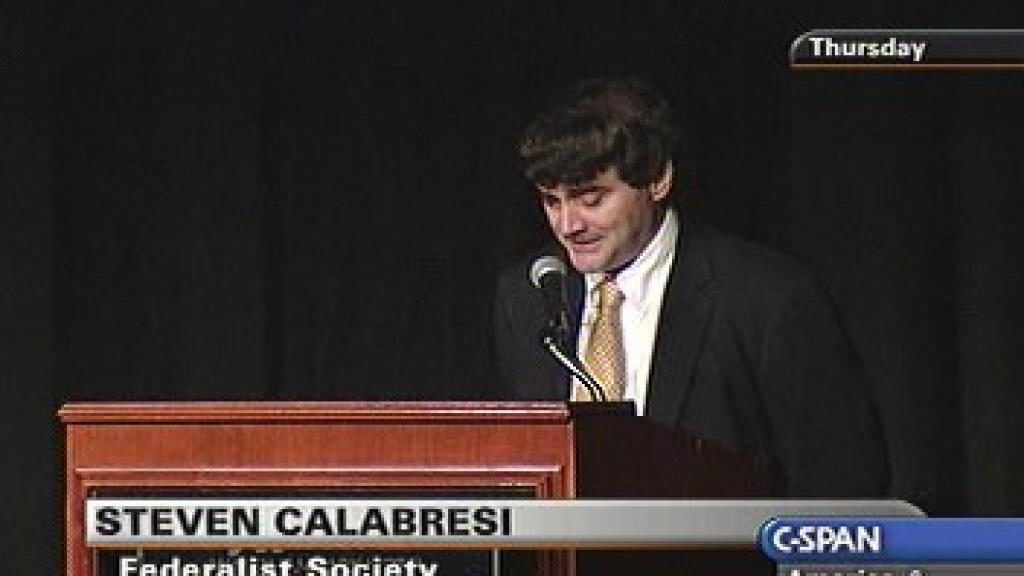What is a legal argument?

I think the United States senate is a terrible, pernicious, dysfunctional institution, and the country would be much better off with a unicameral legislature, as well as term limits for federal judges, strict limits on campaign financing, decriminalized drug laws, a University of Michigan football team that could beat Ohio State more than once a decade, etc.
But I wouldn’t write an op-ed arguing its unconstitutional for California to have only two senators when it has 67 times more people than Wyoming. I wouldn’t do that because that’s not a recognizable legal argument.
Legal arguments are socially constructed, unlike, say the molecular structure of water, but that doesn’t mean they aren’t real. You can’t argue that it’s unconstitutional for California to have only two senators for the same reason you can’t argue that Fargo, North Dakota, is the capital of the United States. Fargo isn’t the capital of the United States, because what determines the identity of the capital of the United States are the beliefs of people about what the capital is (hence it’s a socially constructed fact), but people do indeed hold such beliefs, and in this case those beliefs are not in any meaningful sense ambiguous or uncertain.
When Steven Calabresi — one of the most cited legal scholars in the world, a chaired professor at an elite university, the founder of one of the most important legal and political organizations in the country, in short, one of the top people in his corner of academia — argues that Donald Trump’s sixth amendment rights are being violated by the impeachment proceedings in the House of Representatives, he is not making a recognizable legal argument. That is, he is making an argument that no honest lawyer would claim had any basis in law.
Note that Calabresi is not arguing that the sixth amendment should apply to impeachment proceedings, or that it’s desirable to keep constitutional criminal procedure in mind when thinking about impeachment, in, say, the same way someone might argue that the Senate seats should be apportioned according to state population. He’s arguing that Donald Trump has sixth amendment legal rights that are now being violated by the House of Representatives, and that the members of the House who are leading the impeachment inquiry “should be expelled from the house [sic] for their unconstitutional behavior.”
Calabresi’s Northwestern colleague Steve Lubet summarizes why this argument has no legal basis whatsoever. Again, this isn’t a legal dispute in any meaningful sense of the word, just as there’s no “dispute” about whether Fargo is the capital of the United States, and for the same reason.
That Calabresi allowed this completely bizarre argument to be published under his name (the piece is full of egregious typos, which suggests its author or authorship was troubled in some Bartheian if not Borgian way) is actually quite disturbing. Again, Steven Calabresi is a very big deal in the right wing legal and political world in particular. That he is doing something like this is a very bad sign in regard to where our political and legal discourse is heading.
Why is Steven Calabresi putting forth a pack of Goebbels-level lies for a general audience, most of whose members have no way of knowing that what he’s offering to them under the imprimatur of one of the nation’s great universities is the most mendacious propaganda imaginable?
Has he decided that his political cause is so desperately important that there’s no level of intellectual degradation to which he will not sink? My guess, for what little it’s worth, is that something like that is going on: I can imagine that Calabresi has worked himself into some sort of hysterical state, in which, for example the “lies” that “the Left” ginned up about Brett Kavanaugh justify literally any imaginable sort of retaliatory falsehood, in order to save his longed-for judicial revolution as it rests on the knife edge of history.
In any case, this sort of thing raises some important practical questions. Would his home institution consider it acceptable for a medical school professor to write a column for a general interest publication, claiming that opioids were completely benign drugs, and that anyone should be able to take any amount of them for pain relief?
Steven Calabresi is telling equally outrageous and far more influential lies. This should not be tolerated.


